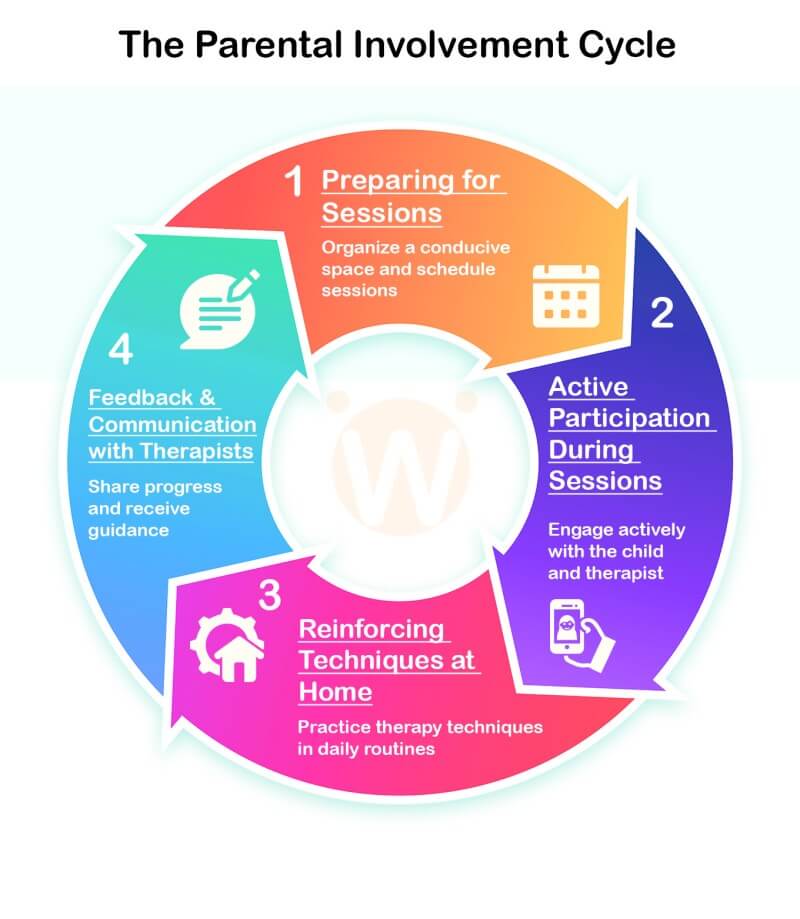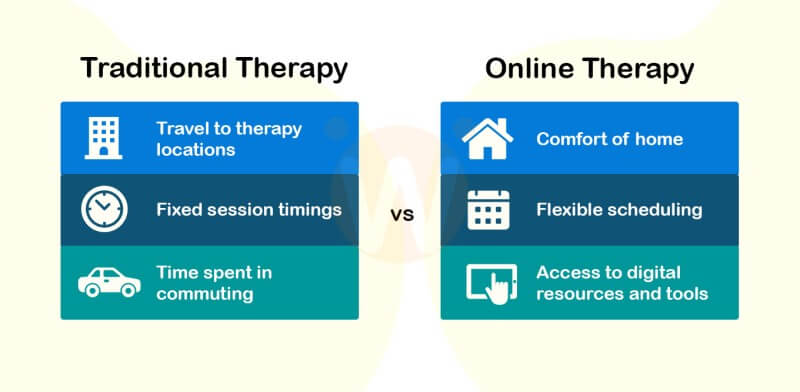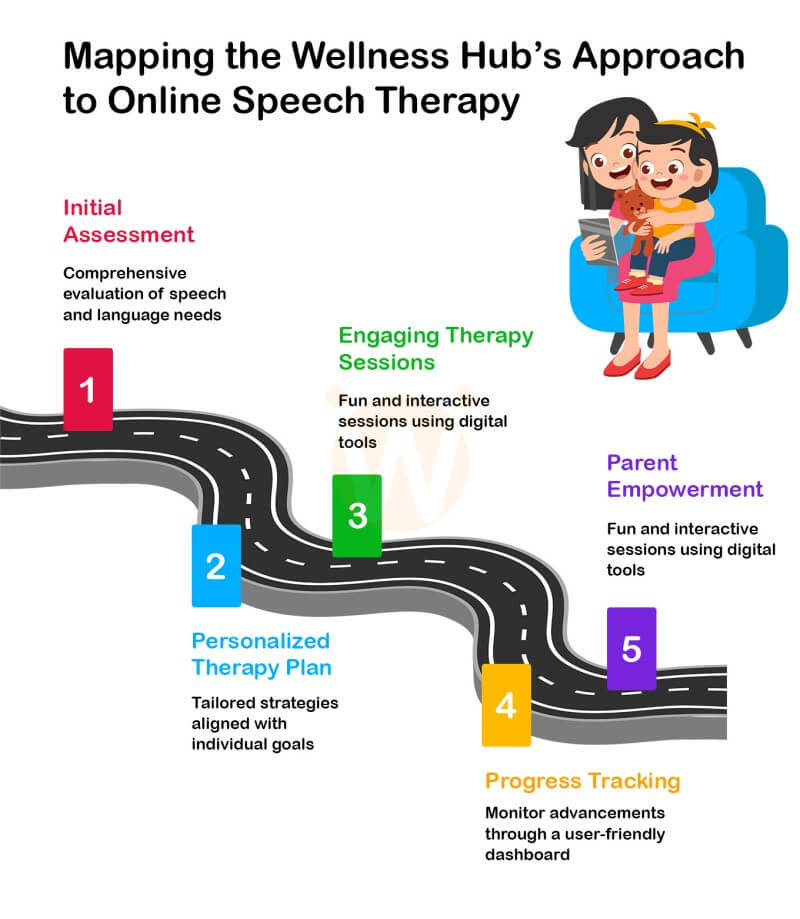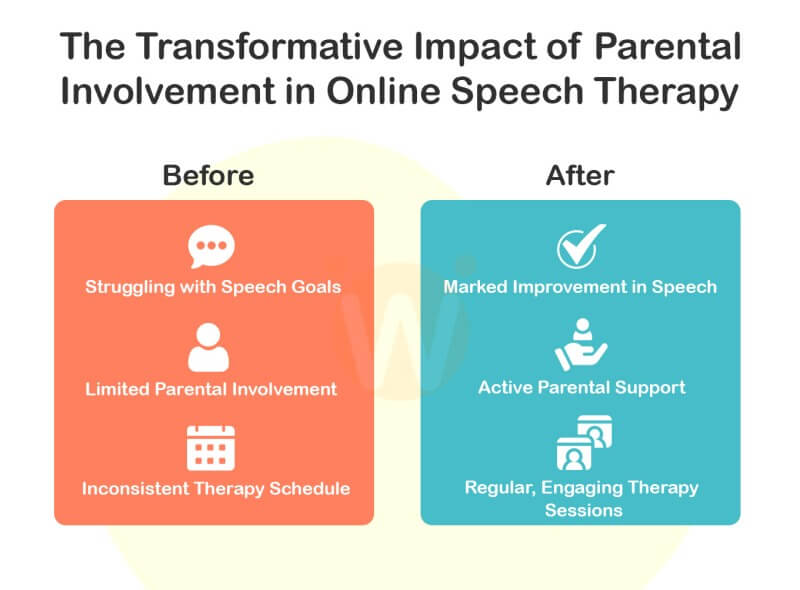The Crucial Role of Parents in Online Speech Therapy
By Rajini D
Last Updated: December 15, 2023
Picture this: your child is comfortably sitting at home, participating in an online speech therapy session. The therapist is guiding them through sounds and words. But here’s the exciting part—you, as a parent, are a key player in this journey. Did you know that your involvement could greatly impact your child’s progress?
With online speech therapy, families now have the flexibility to access therapy from the comfort of their homes. However, one thing remains essential—your role as a parent. You’re not just there to observe; your active participation can make therapy more effective and meaningful for your child.
Understanding the Role of Parents
Essentiality of Parental Engagement
Parents play a crucial role in online speech therapy because they are deeply involved in their child’s daily life. They are not just caregivers—they’re the people who know their child best. When parents actively participate in therapy, the lessons extend beyond the sessions, becoming part of the child’s everyday routine. This makes the therapy more effective and sustainable over time.
Research shows that when parents engage, therapy outcomes improve significantly. Something as simple as practicing speech exercises during a meal or encouraging conversations during play helps children develop their communication skills faster. Online speech therapy has made it even easier for parents to participate by bringing sessions into the comfort of home.
Different Facets of Parental Involvement

Parents can support therapy in different ways, each playing a big part in their child’s success:
1. Providing Feedback to the Therapist
Parents know their child best and can offer valuable feedback to the therapist. Sharing what works well and what doesn’t helps the therapist adjust sessions to meet the child’s needs.
Example: A parent tells the therapist that their child finds a specific exercise challenging. The therapist adjusts the upcoming sessions to focus more on that skill.
2. Creating the Right Environment at Home
A calm, distraction-free space helps children focus during online sessions. This makes the sessions more productive and helps children feel relaxed and engaged.
Example: A parent sets up a quiet room for therapy, ensuring the child is comfortable and well-rested before the session begins.
3. Collaborating with Therapists During Sessions
When parents join sessions, they learn techniques directly from the therapist. This helps them practice the same methods with their child during daily activities, ensuring consistent learning.
Example: A therapist guides a parent on how to help their child pronounce certain sounds. The parent practices the same sounds later during a bedtime story.
4. Practicing Speech Skills During Everyday Activities
Daily activities offer great opportunities to reinforce what children learn in therapy. Practicing speech exercises throughout the day makes learning feel natural and fun.
Example: A parent asks their child to describe the objects they see during a walk, turning a simple stroll into a learning opportunity.
Advantages of Online Speech Therapy for Parental Involvement
The transition to online speech therapy has brought with it a host of benefits, particularly in the realm of parental involvement. These advantages are not just theoretical but are seen and felt in the daily lives of families navigating speech and language challenges.

Flexibility and Convenience
One of the biggest advantages of online speech therapy is its flexibility and convenience. Unlike traditional therapy that requires traveling to a clinic, online sessions can happen right at home. This shift is more than just convenient—it allows therapy to fit easily into family routines. Parents no longer need to juggle schedules or rush through their day to make it to appointments. Instead, they can arrange sessions at times that work best for them.
With this flexibility, parents can become more than just observers in the therapy process. They are actively present and engaged during sessions, gaining valuable insights into techniques used by the therapist. This makes it easier for them to practice those strategies with their child throughout the day.
Example: A parent who works during the day schedules evening therapy sessions, making it easier to participate without disrupting work or school routines.
Integrating Therapy into Daily Life
One of the key benefits of online therapy is how naturally it fits into everyday life. The lessons and strategies learned during sessions can be used in daily interactions and routines, helping children practice and reinforce new skills throughout the day. Instead of limiting practice to the therapy session, children get the chance to apply what they learn in real-world situations.
This consistent, everyday practice helps children make faster progress in developing their speech and language skills. Parents play an essential role here by encouraging communication during daily tasks—whether it’s naming items during play, describing objects on a walk, or practicing new sounds during bedtime stories.
Example: After an online session focused on naming colors, a parent asks their child to identify the colors of their clothes while folding laundry, turning a chore into a learning moment.
Strategies for Effective Parental Engagement
To maximize the benefits of online speech therapy, there are several strategies parents can employ before, during, and after sessions.
Strategies for Parental Engagement in Online Speech Therapy
| Stage | Strategy | Tips |
|---|---|---|
| Preparing for Sessions | Creating a Conducive Environment | – Set up a quiet, distraction-free area. – Ensure a reliable internet connection and functioning technology. – Have all necessary materials (notebook, pen, etc.) at hand. |
| During Sessions | Active Participation and Collaboration | – Engage with the therapist and ask questions. – Observe and understand therapy techniques. – Encourage your child and provide emotional support. |
| Beyond Sessions | Reinforcing Techniques and Exercises at Home | – Incorporate learned techniques into daily routines. – Provide consistent practice opportunities. – Offer positive reinforcement and celebrate progress. |
Preparing for Sessions
Setting up a quiet, comfortable space helps children focus during online therapy. Make sure there are no distractions, and check that your internet, camera, and microphone are working. Preparing everything in advance also shows your child that therapy is important.
Example: A parent ensures the laptop is ready, and the child has eaten a snack to stay focused during the session.
During Sessions
Active participation helps parents learn from the therapist and better support their child. Observing the techniques used and asking questions provides valuable insights for practice at home. Being involved also motivates the child by showing them that therapy matters.
Example: A parent plays a word game during the session, as shown by the therapist, making speech practice enjoyable.
Beyond Sessions
Consistent practice at home helps children retain what they learn. Everyday routines like meals or walks become chances to reinforce new skills. Small efforts, like praising progress, build confidence and keep children motivated.
Example: After a session, the parent asks the child to practice new sounds by naming objects during a walk.
Parental Strategies for Effective Online Speech Therapy
Navigating online speech therapy can feel overwhelming at first, but with the right strategies, parents can play a vital role in making therapy effective and enjoyable for their child.
Communication with Therapists and Creating a Conducive Home Environment
Open communication with therapists is essential. It helps parents understand their child’s needs, therapy goals, and the progress being made. Staying connected with the therapist also allows parents to ask questions and learn how to support their child better at home.
Creating the right environment for therapy is equally important. A quiet, distraction-free space helps the child focus and engage. Ensuring a stable internet connection and preparing any needed tools, such as headphones or a tablet, can prevent disruptions during the session.
Example: A parent regularly checks in with the therapist to discuss progress and adjusts the home setup to reduce distractions, ensuring smoother sessions.
Utilizing Digital Resources for Support
Online therapy opens access to a wide range of digital tools, such as interactive apps, educational videos, and online worksheets. These resources can reinforce what children learn during therapy and provide extra practice between sessions.
Example: A parent uses an app suggested by the therapist to help their child practice sounds through a fun game, making learning more enjoyable.
Case Studies/Examples of Successful Parental Engagement
Real-life examples show the power of active parental involvement in therapy. Families who stay engaged throughout the process often see faster progress and better outcomes.
Example: One parent shared how they practiced speech exercises with their child every day during playtime. This consistent effort resulted in their child mastering certain sounds earlier than expected.
Challenges and Solutions for Parents in Online Speech Therapy
Common Challenges and Solutions in Online Speech Therapy
| Common Challenge | Solution |
|---|---|
| Technical Issues | – Test your equipment before sessions. – Have a backup device ready. – Keep the contact of technical support handy. |
| Child’s Engagement | – Use interactive and fun activities. – Break sessions into shorter, manageable segments. – Regularly change activities to maintain interest. |
| Scheduling | – Plan sessions during times when your child is most attentive. – Use a digital calendar to track and remind you of session times. – Communicate with the therapist to find mutually convenient times. |
| Consistency in Practice | – Set a daily routine for practice. – Use reminders and alarms for regular practice sessions. – Involve the whole family in practice when possible. |
| Parental Involvement | – Educate yourself about speech therapy techniques. – Schedule regular check-ins with the therapist. – Be present and attentive during therapy sessions. |
Addressing Common Obstacles
Parents may encounter challenges such as technical issues or difficulty keeping their child engaged during online sessions. Tackling these challenges early helps keep therapy on track.
Having a backup plan, like switching to a mobile hotspot in case of internet issues, can prevent disruptions. Using creative ways—like turning therapy exercises into games or including rewards—helps maintain the child’s interest and focus during sessions.
Example: When the internet drops, a parent quickly switches to mobile data, ensuring the session continues smoothly without stress.
Practical Tips and Best Practices for Parents
Here are some easy, effective strategies to support your child’s progress in online speech therapy:
- Be consistent with sessions. Stick to the schedule to build a routine and keep your child engaged.
- Incorporate exercises into daily activities. Use mealtimes, walks, or playtime as opportunities to practice speech skills naturally.
- Celebrate small victories. Praise every achievement, no matter how small, to boost your child’s motivation.
- Stay informed. Keep up with new tools, techniques, and resources in online speech therapy to enhance your support.
Example: A parent incorporates therapy exercises by asking their child to name objects during play, turning practice into a fun activity. Just about attending sessions but about being an active participant in their child’s developmental journey.
The Wellness Hub Approach

Embracing Technology and Expertise in Speech Therapy
At Wellness Hub, we understand that every child’s journey in developing communication skills is unique. That’s why our online speech therapy is tailored to meet each child’s individual needs, ensuring personalized care. Our approach goes beyond just sessions—we create an environment where children feel supported and can grow in their communication abilities.
Parent-Centric Therapy Programs
Parents play a vital role in their child’s speech therapy, and we make sure they are involved every step of the way. For younger children, especially those under three years, the focus is on guiding parents to support their child’s development effectively. As the child grows, the therapy becomes a collaborative effort between the therapist, the child, and the parents, ensuring continuous progress.
Example: For toddlers, therapists provide parents with simple exercises to do at home, like encouraging their child to name familiar objects during playtime.
Innovative Use of Digital Tools
We leverage the latest digital tools to make therapy engaging and fun. Our Whiteboard and integrated apps—Speech BASICS and Autism BASICS—are designed to keep children actively involved during sessions. These tools help children stay motivated while making learning feel like play.
Example: A child practices new words on Speech BASICS through interactive games, making learning enjoyable and effective.
Research-Backed Methodologies
All our therapies are grounded in research and tailored to each child’s needs. Our assessments and treatment plans are evidence-based, ensuring children receive the most effective interventions for their speech and language challenges.
Example: A personalized plan is created after assessing a child’s specific difficulties with certain sounds, ensuring targeted progress.
Tracking Progress with Ease
We believe every bit of progress matters. To keep parents involved and informed, we offer a user-friendly dashboard. This tool allows parents to track therapy schedules, monitor progress, and access at-home activities, making it easy to stay engaged in their child’s therapy journey.
Example: A parent logs into the dashboard to review their child’s progress and plans the next at-home practice based on therapist recommendations.
The Transformative Impact of Parental Involvement

The impact of parental involvement in speech therapy can’t be overstated. Real-life stories from families at Wellness Hub show how children can thrive when their parents actively participate in their therapy journey. These examples offer inspiration and encouragement to other parents navigating similar challenges.
Example: One family noticed a significant change when they began practicing speech exercises with their child during daily routines. By making these activities fun and engaging, the child became more confident in using new words, and progress came faster than expected.
Conclusion
In conclusion, parents play a key role in making online speech therapy successful. At Wellness Hub, we are here to support you every step of the way. With the right tools and guidance, you can help your child build strong communication skills and achieve lasting progress. Explore our services to see how we can assist in your child’s development.
Frequently Asked Questions:
1. What is the role of parents in online speech therapy?
Parents play a crucial role in online speech therapy by creating a supportive home environment, actively participating in sessions, and reinforcing therapy techniques in daily life.
2. How can parents prepare for online speech therapy sessions?
Parents can prepare by setting up a quiet, distraction-free space, ensuring a stable internet connection, and having the necessary technological tools ready for the session.
3. What are some effective strategies for parental engagement during therapy sessions?
Effective strategies include active listening, asking questions, observing therapy techniques, and collaborating with the therapist to understand and support the child’s needs.
4. How can digital resources be utilized in online speech therapy?
Digital resources like interactive apps, educational videos, and online worksheets can supplement therapy sessions and provide additional support for the child’s learning.
5. What common challenges do parents face in online speech therapy, and how can they be addressed?
Common challenges include technical issues and keeping the child engaged. These can be addressed by having backup plans for technical glitches and using creative, interactive methods to maintain the child’s interest.
6. How does Wellness Hub support parents in online speech therapy?
Wellness Hub offers personalized therapy programs, innovative digital tools, and a simple-to-use dashboard to help parents track progress and stay engaged in their child’s therapy journey.
7. Can parents receive training or guidance to better support their child in online speech therapy?
Yes, many online speech therapy services, including Wellness Hub, provide specialized training and resources to help parents effectively support their child’s therapy.
8. What are the benefits of integrating speech therapy into daily life?
Integrating therapy into daily life allows for consistent practice and reinforcement, which can significantly enhance the effectiveness of the therapy and lead to faster progress.
9. Are there any real-life success stories of parental involvement in online speech therapy?
Yes, many families have shared their success stories, highlighting the positive impact of parental involvement in enhancing the outcomes of online speech therapy.
10. How can parents stay informed about the latest developments in online speech therapy?
Parents can stay informed by regularly communicating with their child’s therapist, following relevant blogs or forums, and exploring resources provided by their chosen online therapy platform.
About the Author:
Rajini Darugupally
M.Sc., Speech-Language Pathologist (9+ years of experience)
Rajini is a passionate and dedicated Speech-Language Pathologist with over 9+ years of experience, specializing in both developmental speech and language disorders in children and rehabilitation in adults. Driven by a desire to empower each individual to find their voice, Rajini brings a wealth of experience and a warm, genuine approach to therapy. Currently, at Wellness Hub, she thrives in a team environment that values innovation, compassion, and achieving results for their clients.
Book your Free Consultation Today
Parent/Caregiver Info:
Client’s Details:
* Error Message








